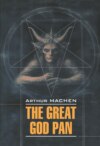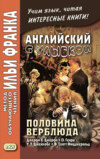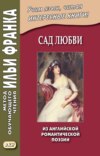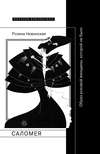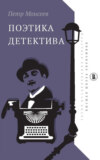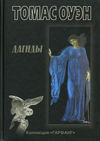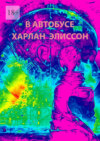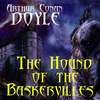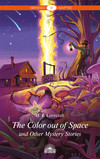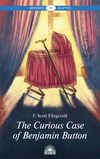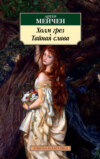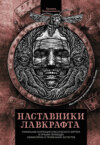Kitabı oku: «The Great God Pan / Великий бог Пан», sayfa 4
VII. The Encounter in Soho
Three weeks later Austin received a note from Villiers, asking him to call either that afternoon or the next. He chose the nearer date, and found Villiers sitting as usual by the window, apparently lost in meditation on the drowsy traffic of the street. There was a bamboo table by his side, a fantastic thing, enriched with gilding and queer painted scenes, and on it lay a little pile of papers arranged and docketed as neatly as anything in Mr. Clarke's office.
'Well, Villiers, have you made any discoveries in the last three weeks?'
'I think so; I have here one or two memoranda which struck me as singular, and there is a statement to which I shall call your attention.'
'And these documents relate to Mrs. Beaumont? It was really Crashaw whom you saw that night standing on the doorstep of the house in Ashley Street?'
'As to that matter my belief remains unchanged, but neither my inquiries nor their results have any special relation to Crashaw. But my investigations have had a strange issue. I have found out who Mrs. Beaumont is!'
'Who is she? In what way do you mean?'
'I mean that you and I know her better under another name.'
'What name is that?'
'Herbert.'
'Herbert!' Austin repeated the word, dazed with astonishment.
'Yes, Mrs. Herbert of Paul Street, Helen Vaughan of earlier adventures unknown to me. You had reason to recognize the expression of her face; when you go home look at the face in Meyrick's book of horrors, and you will know the sources of your recollection.'
'And you have proof of this?'
'Yes, the best of proof; I have seen Mrs. Beaumont, or shall we say Mrs. Herbert?'
'Where did you see her?'
'Hardly in a place where you would expect to see a lady who lives in Ashley Street, Piccadilly. I saw her entering a house in one of the meanest and most disreputable streets in Soho. In fact, I had made an appointment, though not with her, and she was precise to both time and place.'
'All this seems very wonderful, but I cannot call it incredible. You must remember, Villiers, that I have seen this woman, in the ordinary adventure of London society, talking and laughing, and sipping her coffee in a commonplace drawing-room with commonplace people. But you know what you are saying.'
'I do; I have not allowed myself to be led by surmises or fancies. It was with no thought of finding Helen Vaughan that I searched for Mrs. Beaumont in the dark waters of the life of London, but such has been the issue.'
'You must have been in strange places, Villiers.'
'Yes, I have been in very strange places. It would have been useless, you know, to go to Ashley Street, and ask Mrs. Beaumont to give me a short sketch of her previous history. No; assuming, as I had to assume, that her record was not of the cleanest, it would be pretty certain that at some previous time she must have moved in circles not quite so refined as her present ones. If you see mud at the top of a stream, you may be sure that it was once at the bottom. I went to the bottom. I have always been fond of diving into Queer Street for my amusement, and I found my knowledge of that locality and its inhabitants very useful. It is, perhaps, needless to say that my friends had never heard the name of Beaumont, and as I had never seen the lady, and was quite unable to describe her, I had to set to work in an indirect way. The people there know me; I have been able to do some of them a service now and again, so they made no difficulty about giving their information; they were aware I had no communication direct or indirect with Scotland Yard. I had to cast out a good many lines, though, before I got what I wanted, and when I landed the fish I did not for a moment suppose it was my fish. But I listened to what I was told out of a constitutional liking for useless information, and I found myself in possession of a very curious story, though, as I imagined, not the story I was looking for. It was to this effect. Some five or six years ago, a woman named Raymond suddenly made her appearance in the neighbourhood to which I am referring. She was described to me as being quite young, probably not more than seventeen or eighteen, very handsome, and looking as if she came from the country. I should be wrong in saying that she found her level in going to this particular quarter, or associating with these people, for from what I was told, I should think the worst den in London far too good for her. The person from whom I got my information, as you may suppose, no great Puritan, shuddered and grew sick in telling me of the nameless infamies which were laid to her charge. After living there for a year, or perhaps a little more, she disappeared as suddenly as she came, and they saw nothing of her till about the time of the Paul Street case. At first she came to her old haunts only occasionally, then more frequently, and finally took up her abode there as before, and remained for six or eight months. It's of no use my going into details as to the life that woman led; if you want particulars you can look at Meyrick's legacy. Those designs were not drawn from his imagination. She again disappeared, and the people of the place saw nothing of her till a few months ago. My informant told me that she had taken some rooms in a house which he pointed out, and these rooms she was in the habit of visiting two or three times a week and always at ten in the morning. I was led to expect that one of these visits would be paid on a certain day about a week ago, and I accordingly managed to be on the look-out in company with my cicerone at a quarter to ten, and the hour and the lady came with equal punctuality. My friend and I were standing under an archway, a little way back from the street, but she saw us, and gave me a glance that I shall be long in forgetting. That look was quite enough for me; I knew Miss Raymond to be Mrs. Herbert; as for Mrs. Beaumont she had quite gone out of my head. She went into the house, and I watched it till four o'clock, when she came out, and then I followed her. It was a long chase, and I had to be very careful to keep a long way in the background, and yet not lose sight of the woman. She took me down to the Strand, and then to Westminster, and then up St. James's Street, and along Piccadilly. I felt queerish when I saw her turn up Ashley Street; the thought that Mrs. Herbert was Mrs. Beaumont came into my mind, but it seemed too impossible to be true. I waited at the corner, keeping my eye on her all the time, and I took particular care to note the house at which she stopped. It was the house with the gay curtains, the home of flowers, the house out of which Crashaw came the night he hanged himself in his garden. I was just going away with my discovery, when I saw an empty carriage come round and draw up in front of the house, and I came to the conclusion that Mrs. Herbert was going out for a drive, and I was right. There, as it happened, I met a man I know, and we stood talking together a little distance from the carriage-way, to which I had my back. We had not been there for ten minutes when my friend took off his hat, and I glanced round and saw the lady I had been following all day. 'Who is that?' I said, and his answer was 'Mrs. Beaumont; lives in Ashley Street.' Of course there could be no doubt after that. I don't know whether she saw me, but I don't think she did. I went home at once, and, on consideration, I thought that I had a sufficiently good case with which to go to Clarke.'
'Why to Clarke?'
'Because I am sure that Clarke is in possession of facts about this woman, facts of which I know nothing.'
'Well, what then?'
Mr. Villiers leaned back in his chair and looked reflectively at Austin for a moment before he answered:
'My idea was that Clarke and I should call on Mrs. Beaumont.'
'You would never go into such a house as that? No, no, Villiers, you cannot do it. Besides, consider; what result…'
'I will tell you soon. But I was going to say that my information does not end here; it has been completed in an extraordinary manner.
'Look at this neat little packet of manuscript; it is paginated, you see, and I have indulged in the civil coquetry of a ribbon of red tape.
It has almost a legal air, hasn't it? Run your eye over it, Austin. It is an account of the entertainment Mrs. Beaumont provided for her choicer guests. The man who wrote this escaped with his life, but I do not think he will live many years. The doctors tell him he must have sustained some severe shock to the nerves.'
Austin took the manuscript, but never read it. Opening the neat pages at haphazard his eye was caught by a word and a phrase that followed it; and, sick at heart, with white lips and a cold sweat pouring like water from his temples, he flung the paper down.
'Take it away, Villiers, never speak of this again. Are you made of stone, man? Why, the dread and horror of death itself, the thoughts of the man who stands in the keen morning air on the black platform, bound, the bell tolling in his ears, and waits for the harsh rattle of the bolt, are as nothing compared to this. I will not read it; I should never sleep again.'
'Very good. I can fancy what you saw. Yes; it is horrible enough; but after all, it is an old story, an old mystery played in our day, and in dim London streets instead of amidst the vineyards and the olive gardens. We know what happened to those who chanced to meet the Great God Pan, and those who are wise know that all symbols are symbols of something, not of nothing. It was, indeed, an exquisite symbol beneath which men long ago veiled their knowledge of the most awful, most secret forces which lie at the heart of all things; forces before which the souls of men must wither and die and blacken, as their bodies blacken under the electric current. Such forces cannot be named, cannot be spoken, cannot be imagined except under a veil and a symbol, a symbol to the most of us appearing a quaint, poetic fancy, to some a foolish tale. But you and I, at all events, have known something of the terror that may dwell in the secret place of life, manifested under human flesh; that which is without form taking to itself a form. Oh, Austin, how can it be? How is it that the very sunlight does not turn to blackness before this thing, the hard earth melt and boil beneath such a burden?'
Villiers was pacing up and down the room, and the beads of sweat stood out on his forehead. Austin sat silent for a while, but Villiers saw him make a sign upon his breast.
'I say again, Villiers, you will surely never enter such a house as that? You would never pass out alive.'
'Yes, Austin, I shall go out alive-I, and Clarke with me.'
'What do you mean? You cannot, you would not dare…'
'Wait a moment. The air was very pleasant and fresh this morning; there was a breeze blowing, even through this dull street, and I thought I would take a walk. Piccadilly stretched before me a clear, bright vista, and the sun flashed on the carriages and on the quivering leaves in the park. It was a joyous morning, and men and women looked at the sky and smiled as they went about their work or their pleasure, and the wind blew as blithely as upon the meadows and the scented gorse. But somehow or other I got out of the bustle and the gaiety, and found myself walking slowly along a quiet, dull street, where there seemed to be no sunshine and no air, and where the few foot-passengers loitered as they walked, and hung indecisively about corners and archways. I walked along, hardly knowing where I was going or what I did there, but feeling impelled, as one sometimes is, to explore still further, with a vague idea of reaching some unknown goal. Thus I forged up the street, noting the small traffic of the milk-shop, and wondering at the incongruous medley of penny pipes, black tobacco, sweets, newspapers, and comic songs which here and there jostled one another in the short compass of a single window. I think it was a cold shudder that suddenly passed through me that first told me that I had found what I wanted. I looked up from the pavement and stopped before a dusty shop, above which the lettering had faded, where the red bricks of two hundred years ago had grimed to black; where the windows had gathered to themselves the dust of winters innumerable. I saw what I required; but I think it was five minutes before I had steadied myself and could walk in and ask for it in a cool voice and with a calm face. I think there must even then have been a tremor in my words, for the old man who came out of the back parlour, and fumbled slowly amongst his goods, looked oddly at me as he tied the parcel. I paid what he asked, and stood leaning by the counter, with a strange reluctance to take up my goods and go. I asked about the business, and learnt that trade was bad and the profits cut down sadly; but then the street was not what it was before traffic had been diverted, but that was done forty years ago, 'just before my father died,' he said. I got away at last, and walked along sharply; it was a dismal street indeed, and I was glad to return to the bustle and the noise. Would you like to see my purchase?'
Austin said nothing, but nodded his head slightly; he still looked white and sick. Villiers pulled out a drawer in the bamboo table, and showed Austin a long coil of cord, hard and new; and at one end was a running noose.
'It is the best hempen cord,' said Villiers, 'just as it used to be made for the old trade, the man told me. Not an inch of jute from end to end.'
Austin set his teeth hard, and stared at Villiers, growing whiter as he looked.
'You would not do it,' he murmured at last. 'You would not have blood on your hands. My God!' he exclaimed, with sudden vehemence, 'you cannot mean this, Villiers, that you will make yourself a hangman?'
'No. I shall offer a choice, and leave Helen Vaughan alone with this cord in a locked room for fifteen minutes. If when we go in it is not done, I shall call the nearest policeman. That is all.'
'I must go now. I cannot stay here any longer; I cannot bear this. Good night.'
'Good night, Austin.'
The door shut, but in a moment it was open again, and Austin stood, white and ghastly, in the entrance.
'I was forgetting,' he said, 'that I too have something to tell. I have received a letter from Dr. Harding of Buenos Ayres. He says that he attended Meyrick for three weeks before his death.'
'And does he say what carried him off in the prime of life? It was not fever?'
'No, it was not fever. According to the doctor, it was an utter collapse of the whole system, probably caused by some severe shock. But he states that the patient would tell him nothing, and that he was consequently at some disadvantage in treating the case.'
'Is there anything more?'
'Yes. Dr. Harding ends his letter by saying: 'I think this is all the information I can give you about your poor friend. He had not been long in Buenos Ayres, and knew scarcely any one, with the exception of a person who did not bear the best of characters, and has since left-a Mrs. Vaughan.''
VIII. The Fragments
[Amongst the papers of the well-known physician, Dr. Robert Matheson, of Ashley Street, Piccadilly, who died suddenly, of apoplectic seizure, at the beginning of 1892, a leaf of manuscript paper was found, covered with pencil jottings. These notes were in Latin, much abbreviated, and had evidently been made in great haste. The MS. was only deciphered with difficulty, and some words have up to the present time evaded all the efforts of the expert employed. The date, 'XXV Jul. 1888,' is written on the right-hand corner of the MS. The following is a translation of Dr. Matheson's manuscript.]
'Whether science would benefit by these brief notes if they could be published, I do not know, but rather doubt. But certainly I shall never take the responsibility of publishing or divulging one word of what is here written, not only on account of my oath given freely to those two persons who were present, but also because the details are too abominable. It is probably that, upon mature consideration, and after weighting the good and evil, I shall one day destroy this paper, or at least leave it under seal to my friend D., trusting in his discretion, to use it or to burn it, as he may think fit.
'As was befitting, I did all that my knowledge suggested to make sure that I was suffering under no delusion. At first astounded, I could hardly think, but in a minute's time I was sure that my pulse was steady and regular, and that I was in my real and true senses. I then fixed my eyes quietly on what was before me.
'Though horror and revolting nausea rose up within me, and an odour of corruption choked my breath, I remained firm. I was then privileged or accursed, I dare not say which, to see that which was on the bed, lying there black like ink, transformed before my eyes. The skin, and the flesh, and the muscles, and the bones, and the firm structure of the human body that I had thought to be unchangeable, and permanent as adamant, began to melt and dissolve.
'I know that the body may be separated into its elements by external agencies, but I should have refused to believe what I saw. For here there was some internal force, of which I knew nothing, that caused dissolution and change.
'Here too was all the work by which man had been made repeated before my eyes. I saw the form waver from sex to sex, dividing itself from itself, and then again reunited. Then I saw the body descend to the beasts whence it ascended, and that which was on the heights go down to the depths, even to the abyss of all being. The principle of life, which makes organism, always remained, while the outward form changed.
'The light within the room had turned to blackness, not the darkness of night, in which objects are seen dimly, for I could see clearly and without difficulty. But it was the negation of light; objects were presented to my eyes, if I may say so, without any medium, in such a manner that if there had been a prism in the room I should have seen no colours represented in it.
'I watched, and at last I saw nothing but a substance as jelly. Then the ladder was ascended again… [here the MS. is illegible]… for one instance I saw a Form, shaped in dimness before me, which I will not farther describe. But the symbol of this form may be seen in ancient sculptures, and in paintings which survived beneath the lava, too foul to be spoken of… as a horrible and unspeakable shape, neither man nor beast, was changed into human form, there came finally death.
'I who saw all this, not without great horror and loathing of soul, here write my name, declaring all that I have set on this paper to be true.
'ROBERT MATHESON, Med. Dr.'
…Such, Raymond, is the story of what I know and what I have seen. The burden of it was too heavy for me to bear alone, and yet I could tell it to none but you. Villiers, who was with me at the last, knows nothing of that awful secret of the wood, of how what we both saw die, lay upon the smooth, sweet turf amidst the summer flowers, half in sun and half in shadow, and holding the girl Rachel's hand, called and summoned those companions, and shaped in solid form, upon the earth we tread upon, the horror which we can but hint at, which we can only name under a figure. I would not tell Villiers of this, nor of that resemblance, which struck me as with a blow upon my heart, when I saw the portrait, which filled the cup of terror at the end. What this can mean I dare not guess. I know that what I saw perish was not Mary, and yet in the last agony Mary's eyes looked into mine. Whether there can be any one who can show the last link in this chain of awful mystery, I do not know, but if there be any one who can do this, you, Raymond, are the man. And if you know the secret, it rests with you to tell it or not, as you please.
I am writing this letter to you immediately on my getting back to town. I have been in the country for the last few days; perhaps you may be able to guess in which part. While the horror and wonder of London was at its height-for 'Mrs. Beaumont,' as I have told you, was well known in society-I wrote to my friend Dr. Phillips, giving some brief outline, or rather hint, of what happened, and asking him to tell me the name of the village where the events he had related to me occurred. He gave me the name, as he said with the less hesitation, because Rachel's father and mother were dead, and the rest of the family had gone to a relative in the State of Washington six months before. The parents, he said, had undoubtedly died of grief and horror caused by the terrible death of their daughter, and by what had gone before that death. On the evening of the day which I received Phillips' letter I was at Caermaen, and standing beneath the mouldering Roman walls, white with the winters of seventeen hundred years, I looked over the meadow where once had stood the older temple of the 'God of the Deeps,' and saw a house gleaming in the sunlight. It was the house where Helen had lived. I stayed at Caermaen for several days. The people of the place, I found, knew little and had guessed less. Those whom I spoke to on the matter seemed surprised that an antiquarian (as I professed myself to be) should trouble about a village tragedy, of which they gave a very commonplace version, and, as you may imagine, I told nothing of what I knew. Most of my time was spent in the great wood that rises just above the village and climbs the hillside, and goes down to the river in the valley; such another long lovely valley, Raymond, as that on which we looked one summer night, walking to and fro before your house. For many an hour I strayed through the maze of the forest, turning now to right and now to left, pacing slowly down long alleys of undergrowth, shadowy and chill, even under the midday sun, and halting beneath great oaks; lying on the short turf of a clearing where the faint sweet scent of wild roses came to me on the wind and mixed with the heavy perfume of the elder, whose mingled odour is like the odour of the room of the dead, a vapour of incense and corruption. I stood at the edges of the wood, gazing at all the pomp and procession of the foxgloves towering amidst the bracken and shining red in the broad sunshine, and beyond them into deep thickets of close undergrowth where springs boil up from the rock and nourish the water-weeds, dank and evil. But in all my wanderings I avoided one part of the wood; it was not till yesterday that I climbed to the summit of the hill, and stood upon the ancient Roman road that threads the highest ridge of the wood. Here they had walked, Helen and Rachel, along this quiet causeway, upon the pavement of green turf, shut in on either side by high banks of red earth, and tall hedges of shining beech, and here I followed in their steps, looking out, now and again, through partings in the boughs, and seeing on one side the sweep of the wood stretching far to right and left, and sinking into the broad level, and beyond, the yellow sea, and the land over the sea. On the other side was the valley and the river and hill following hill as wave on wave, and wood and meadow, and cornfield, and white houses gleaming, and a great wall of mountain, and far blue peaks in the north. And so at last I came to the place. The track went up a gentle slope, and widened out into an open space with a wall of thick undergrowth around it, and then, narrowing again, passed on into the distance and the faint blue mist of summer heat. And into this pleasant summer glade Rachel passed a girl, and left it, who shall say what? I did not stay long there.
In a small town near Caermaen there is a museum, containing for the most part Roman remains which have been found in the neighbourhood at various times. On the day after my arrival in Caermaen I walked over to the town in question, and took the opportunity of inspecting the museum. After I had seen most of the sculptured stones, the coffins, rings, coins, and fragments of tessellated pavement which the place contains, I was shown a small square pillar of white stone, which had been recently discovered in the wood of which I have been speaking, and, as I found on inquiry, in that open space where the Roman road broadens out. On one side of the pillar was an inscription, of which I took a note. Some of the letters have been defaced, but I do not think there can be any doubt as to those which I supply. The inscription is as follows:
DEVOMNODENTi
FLAvIVSSENILISPOSSVit
PROPTERNVPtias
quaSVIDITSVBVMBra
'To the great god Nodens (the god of the Great Deep or Abyss) Flavius Senilis has erected this pillar on account of the marriage which he saw beneath the shade.'
The custodian of the museum informed me that local antiquaries were much puzzled, not by the inscription, or by any difficulty in translating it, but as to the circumstance or rite to which allusion is made.
…And now, my dear Clarke, as to what you tell me about Helen Vaughan, whom you say you saw die under circumstances of the utmost and almost incredible horror. I was interested in your account, but a good deal, nay all, of what you told me I knew already. I can understand the strange likeness you remarked in both the portrait and in the actual face; you have seen Helen's mother. You remember that still summer night so many years ago, when I talked to you of the world beyond the shadows, and of the god Pan. You remember Mary. She was the mother of Helen Vaughan, who was born nine months after that night.
Mary never recovered her reason. She lay, as you saw her, all the while upon her bed, and a few days after the child was born she died. I fancy that just at the last she knew me; I was standing by the bed, and the old look came into her eyes for a second, and then she shuddered and groaned and died. It was an ill work I did that night when you were present; I broke open the door of the house of life, without knowing or caring what might pass forth or enter in. I recollect your telling me at the time, sharply enough, and rightly too, in one sense, that I had ruined the reason of a human being by a foolish experiment, based on an absurd theory. You did well to blame me, but my theory was not all absurdity. What I said Mary would see she saw, but I forgot that no human eyes can look on such a sight with impunity. And I forgot, as I have just said, that when the house of life is thus thrown open, there may enter in that for which we have no name, and human flesh may become the veil of a horror one dare not express. I played with energies which I did not understand, you have seen the ending of it. Helen Vaughan did well to bind the cord about her neck and die, though the death was horrible. The blackened face, the hideous form upon the bed, changing and melting before your eyes from woman to man, from man to beast, and from beast to worse than beast, all the strange horror that you witness, surprises me but little. What you say the doctor whom you sent for saw and shuddered at I noticed long ago; I knew what I had done the moment the child was born, and when it was scarcely five years old I surprised it, not once or twice but several times with a playmate, you may guess of what kind. It was for me a constant, an incarnate horror, and after a few years I felt I could bear it no more, and I sent Helen Vaughan away. You know now what frightened the boy in the wood. The rest of the strange story, and all else that you tell me, as discovered by your friend, I have contrived to learn from time to time, almost to the last chapter. And now Helen is with her companions…
NOTE. – Helen Vaughan was born on August 5th, 1865, at the Red House, Breconshire, and died on July 25th, 1888, in her house in a street off Piccadilly, called Ashley Street in the story.
Ücretsiz ön izlemeyi tamamladınız.
